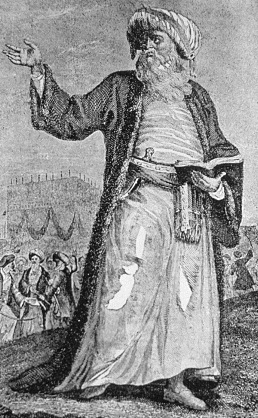
Jesus ushered in a new way of looking at taxes: he acknowledged the power of the state to collect it, but he worked to reform individual tax collectors by abandoning their sins, and Jesus never profited from taxes himself.
Muhammad, on the other hand…eschewed any separation between secular government and religious authority. Unlike the largely spiritual ministry of Jesus, Muhammad engaged in secular pursuits of business, warfare, and governance. The objectives of Muhammad and of Islam would soon necessitate the development of the Bayt al-Mal, or house of money, to serve as the treasury of the new Islamic state.
It was Muhammad who announced tax levies in the Koran including the zakat (9:60) and the jizya (9:29).
Muhammad also established tax rates. He declared rates of 2½ percent on goods and money (Sahih Bukhari 2.24.534), 10 percent on agricultural yields (Sahih Muslim 5.2143), and 20 percent on ghanima (Koran 8:42). He also established minimum taxable amounts (Sahih Bukhari 2. 24.487).
Muhammad personally appraised property to assess its taxable worth:
We took part in the holy battle of Tabuk in the company of the Prophet [Muhammad] and when we arrived at the Wadi-al-Qura, there was a woman in her garden. The Prophet asked his companions to estimate the amount of the fruits in the garden, and Allah’s Apostle estimated it at ten Awsuq. The Prophet said to that lady, “Check what your garden will yield”… [H]e asked that woman how much her garden had yielded. She said, “Ten Awsuq,” and that was what Allah’s Apostle had estimated. (Sahih Bukhari 2. 24.559)
Muhammad also supervised tax collections:
- “Allah’s Apostle had taken the Jizya from the Magians of Hajar” (Sahih Bukhari 4.53.384)
- “Allah’s Apostle sent Abu ‘Ubaida bin Al-Jarreh to Bahrain to collect the Jizya” (Sahih Bukhari 4.53.385).
- “Allah’s Apostle (p.b.u.h) ordered (a person) to collect Zakat” (Sahih Bukhari 2.24.547)
- “The Prophet appointed a man from the tribe of Al-Azd, called Ibn ‘Utbiyya for collecting the Zakat.” (Sahih Bukhari 3.47.769)
Muhammad personally received the ushr, jizya, and zakat tax payments:
- The ushr: “Dates used to be brought to Allah’s Apostle immediately after being plucked. Different persons would bring their dates till a big heap collected (in front of the Prophet)” (Sahih Bukhari 2.24.562).
- The jizya: “Money from Bahrain was brought to the Prophet . He said, ‘Spread it in the Mosque.’” (Sahih Bukhari 4.53.390).
- The zakat on flocks & herds: “I saw in the hand of Allah’s Messenger (may peace be upon him) an instrument for cauterisation and he was cauterising the caracia collected as Zakat” (Sahih Muslim 24.5288).
It’s remarkable enough that Muhammad engaged in tax collecting, but even more so for the favor he bestowed upon other individuals involved in the tax process. Muhammad’s tax emissary to Bahrain, Abu ‘Ubaida bin Al-Jarrah, was one of Muhammad’s ten favorite people who was guaranteed to enter paradise. Muslims have glorified Ubaida for his role in building the Islamic state. Notice the bags of gold on this hagiographic book cover in honor of the Prophet’s taxing companion:
